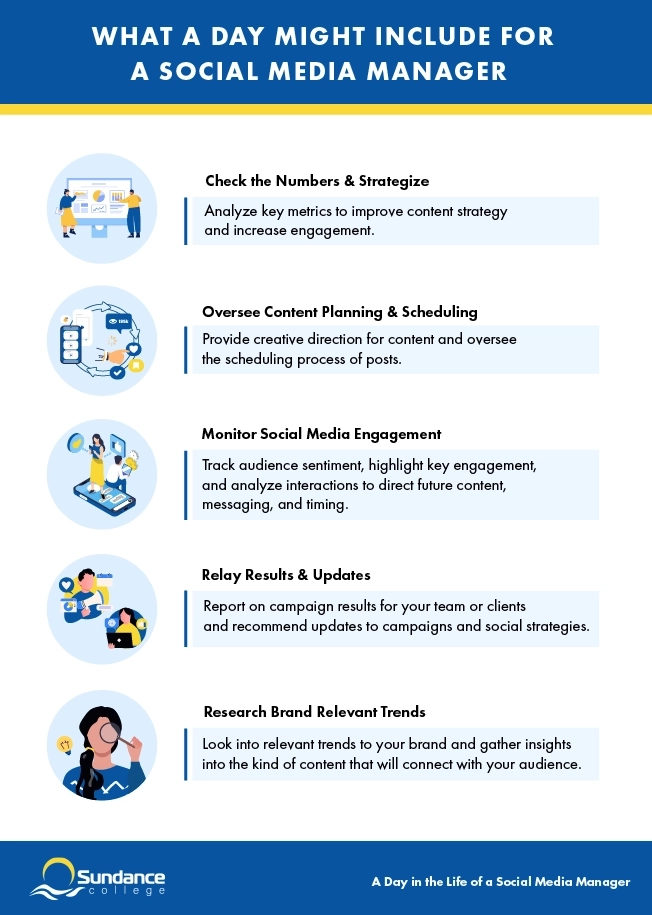Blog / Social Media Manager: What Do They Do in a Day?
Social Media Manager: What Do They Do in a Day?

Digital Marketing and Social Media Management Diploma
- Digital Marketing Assistant/Coordinator
- Advertising Account Executive
- Marketing Assistant/Coordinator
- Content Marketer
Table of Contents
Behind every post you double-tap is a social media manager making countless strategic decisions. Their day isn’t just about picking the right photo or writing a catchy caption – it’s about building community, protecting brand reputation, and driving real business results.
Here’s what a social media manager’s typical day could include:
Listen to: Social Media Manager: What Do They Do in a Day?
Review Metrics & Improve Strategy
Your day might involve reviewing the latest performance analytics. Jinman Z., Sundance College’s Digital Marketing and Social Media Management instructor, explains:
“People think social media is all creativity, but a part of the day is spent interpreting data to figure out what’s actually working and why.”
Tracking metrics like engagement rates, click-throughs, and watch time is essential to any social media manager’s workflow; it helps you strategize better ways to create content, engage your audience, and quickly take note of new data trends to influence future content planning.
Lead Content Planning & Overseeing Scheduling
As a social media manager, you play a vital role in content planning. You might have days when your content calendar is finalized, where you’ll provide creative direction through reviewing drafts, offering feedback, or overseeing the scheduling process.
Other days, you’ll work with your social media coordinator to find the best times to post based on audience activity and past performance.
Instructor, Jinman Z., emphasizes the importance of post timing:
“Well-timed posts are how you get seen by the audience, and therefore the algorithm – more engagement means it reaches more people.”
Through insight like this, you make sure all posts meet quality standards and are scheduled correctly and consistently before going live.
Tools Used for Social Media Management
You’ll stay organized and generate key insights through built-in analytics and scheduling tools across different platforms. YouTube Studio, Instagram Insights, or TikTok’s dashboard will come in handy for queuing up your posts in advance and showcasing:
- How posts are performing
- Who’s engaging with your posts
- How follower count is growing
With tools like Environics Analytics, you’ll be able to build a detailed profile of your audience based on:
- Demographic
- Behaviours
- Finances
- Health
- Psychographic insights
For better means of data management and performance tracking, you’ll turn to more advanced tools like Google Analytics and BlueKai.
You may also use content creation tools like Canva, scheduling tools like Hootsuite, and social listening tools like Brandwatch.
These daily digital tools help you stay relevant to your target audience while making sure your campaigns remain aligned with brand goals.
Monitor Online Engagement

With content queued up, you’ll jump to moderating social media engagement. While you may not be the person replying to comments, you may need to monitor overall audience reactions to your content, flag important engagement, or analyze the kind of engagement you’re receiving to inform future decisions on content type, messaging, and timing.
Instructor, Jinman Z., shares responding quickly with your insights as a social media manager is important:
“Engaging promptly not only builds trust but also turns casual followers into loyal fans by showing them there’s a real person behind the brand.”
Your input helps to humanize your brand, strengthens your connections with your audience, and presents your brand as relevant and relatable.
Report Analytics & Strategy Updates
Some days, you’ll be tracking KPIs (key performance indicators) and reporting on campaign metrics to company stakeholders while proposing changes to campaigns and overall social media strategies.
As instructor Jinman Z., explains:
“At this stage, you’re not just looking at likes: you’re identifying patterns in audience behaviour and engagement that build over weeks or months to see what truly resonates.”
This ongoing cycle of review and adjustment helps you keep your content strategy sharp, responsive, and aligned with your brand’s overall goals.
Team Collaboration and Client Check-ins
Marketing meetings are where you keep your team or clients up to date about:
- Upcoming posts, new trends, and potential issues
- Key metrics and audience insights
- Creative ideas for upcoming content
- Performance updates
- Delivery timelines and approval deadlines
Instructor, Jinman Z., highlights the value of collaboration on meeting days:
“Some of our best ideas come from brainstorming sessions with the team. When we build on each other’s insights, we find solutions we wouldn’t have reached individually.”
Strong communication and team coordination with these check-ins help resolve issues quickly, keep messaging consistent, and maintain campaign timelines.
Research Brand Relevant Trends
Sometimes you’ll carve out time for research. From exploring platforms like TikTok for trending content ideas to reading industry blogs on emerging marketing trends, Jinman Z., explains how this part of your day keeps your content strategy fresh and competitive:
“It’s not about chasing every trend. Staying curious and open to new ideas helps your brand keep pace with your audience’s shifting expectations.”
This helps you to look for patterns and ideas that could support your long-term content strategy, providing insight into the kind of content that will help your brand connect with your audience.

Top Skills Every Social Media Manager Needs
To succeed in this role, these are the must-have social media management skills you’ll need:
Hard Skills
- Digital marketing fundamentals – including SEO and PPC – to expand your reach and effectively target audiences.
- Platform analytics and scheduling tools – such as YouTube Studio, Instagram Insights, or TikTok’s dashboard – to track performance and plan consistent, timely content.
- Analytics and data tools – like Environics Analytics for detailed audience insights, and Google Analytics or BlueKai for data management and performance tracking.
Soft Skills
- Creativity to craft engaging and platform-relevant content.
- Time management & adaptability to juggle campaigns and adjust plans quickly.
- Critical thinking & problem-solving to improve results based on data.
- Communication & collaboration to align with your team and engage audiences.
With the right training, you’ll have the digital marketing skills you need for a creative career in social media management.
Launch Your Social Media Career with Sundance College
Sundance College’s Digital Marketing and Social Media Management diploma program will teach you how to develop and measure sound strategies, turn your ideas into content, and communicate clearly across platforms. With a practicum included, you’ll graduate with practiced skills and experience, prepared to help brands stay visible, relevant, and competitive.
Creativity, strategic thinking, and data analysis all come together in the life of a social media manager. It’s a role that will challenge you to think differently, connect with people, and turn insights into action. The lifestyle of a digital marketer offers a unique blend of creative expression and strategic thinking that makes it a career path worth exploring.
Behind every top brand is a skilled social media manager. Build your career in social media – explore our Digital Marketing & Social Media Management Diploma.
FAQ
-
What daily tasks does a social media manager handle?
Social media managers review key performance metrics, lead content planning, monitor emerging trends, and make decisions when strategy needs to shift. They also collaborate with marketing teams and manage campaign rollouts.
-
How does a social media manager plan and schedule content throughout the day?
Social media managers are not always the ones who schedule posts. They review and approve content, coordinate with team members, and remain flexible to accommodate last-minute changes, especially when jumping on trending or time-sensitive opportunities.
-
What tools do social media managers use on a daily basis?
Social media managers use built-in platform analytics and scheduling tools like YouTube Studio, Instagram Insights, and TikTok Analytics dashboard. For in-depth analytics and data, Google Analytics and BlueKai or to understand audiences personally, use Environics Analytics.
-
How do social media managers monitor and respond to engagement during the day?
Social media managers use dashboards and monitoring tools to track engagement across channels. While they may delegate direct responses to coordinators, they oversee tone, escalation protocols, and overall sentiment. They also use engagement insights to refine messaging and inform future content decisions.
-
What challenges do social media managers face during their daily routine?
Balancing immediate responsiveness with long-term strategy, like managing platforms, adapting to frequent algorithm changes, maintaining brand consistency, and responding to audience feedback is an ongoing requirement for social media managers.
-
How can soft skills impact a social media manager’s success?
Soft skills help social media managers connect authentically with audiences, colleagues, and clients, adapt quickly to changing trends, and handle multiple tasks efficiently.
Related Blogs
Subscribe for more career advice
Blog Categories
Share on:
